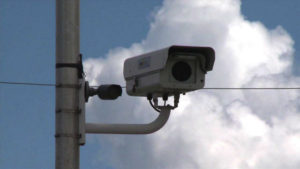Here we go … again!
The Texas Legislature is going to consider a bill — maybe more than one of them — to ban cities from deploying red-light cameras at dangerous intersections.
Stop me before my head explodes!
Amarillo is one of those cities that has put the cameras to good use at various intersections. City traffic and police officials reported recently that the cameras are doing their job. They are preventing motorists from running through red lights and putting other motorists in jeopardy.
But that ain’t stopping lawmakers from seeking to ban the cameras. The irony of this effort in this legislative body is too rich to ignore.
I’ll start with this fact: Republicans dominate both legislative chambers. The Republican Party traditionally has been the party that seeks to invest more control of government affairs to local authorities. Not so as it regards the cameras. In this instance, the paternalistic state is better equipped than the locals to determine whether there is a need for police to have some electronic help in preventing motorists from ignoring red lights.
http://www.dallasnews.com/news/politics/2016/11/25/lawmakers-will-try-ban-red-light-traffic-cameras
Yes, some cities have taken the cameras down after using them for a time. Residents don’t like them? Fine, cities react to their constituents’ concerns.
Lubbock had them. Then they took ’em down.
Amarillo has deployed the cameras since 2008. Sure, there’s been some griping. Has any group put together a petition drive to get them taken down? No. The City Council remains firm in its commitment to using the cameras. I applaud the council for its persistence.
In the interest of full disclosure, I’ve been caught once running a red light. I didn’t do it on purpose. I just forgot about the camera posted at 10th and South Taylor in downtown Amarillo; I drove through the intersection and got caught. The camera took a picture of my car’s license plate and I got a ticket in the mail; I paid the ticket.
So, why does the Legislature want to meddle in cities’ decisions? According to the Dallas Morning News: “Whenever these cameras are put on the ballot box [in cities] … the cameras never win,” said Dallas Republican Sen. Don Huffines, who recently wrote a bill to get rid of the cameras. “They’re not popular, and people are tired of being found guilty by a camera.”
So what if a camera does what a traffic cop can’t do at that moment? I keep thinking back to something that former Amarillo Councilwoman Ellen Green once said in defense of the cameras. She said, essentially, that if you don’t want to pay the fine “don’t run the red lights.”
I have no clue whether the Legislature will make good on its effort to interfere with local prerogative. I do hope, though, that it backs off yet again. Let local traffic and law enforcement authorities determine the best way to keep lawbreaking motorists in line.

Red light cameras are always a predatory money grab scam. The state needs to ban the cameras to protect mostly safe drivers from what amounts to a government-run for-profit racket. The cameras are very expensive and produce enough fines to even pay their own typical costs of $4,000 to $5,000 per month per camera only by ticketing mostly safe drivers for small technical fouls that endangered no one. Two scams are used to rob mostly safe drivers: 1) yellow intervals are set slightly too short for the ACTUAL perception/reaction times and ACTUAL approach speeds of at least 85% of the drivers (safest timing method) and 2) cameras ticket safe slow rolling right on red turns that federal research shows are involved in only six one-hundredths of one percent (0.06% or 0.0006) of crashes with injuries or fatalities. If the cameras ticketed only the tiny percentage of dangerous drivers, no one would object, but then the cameras would instantly go bankrupt with total fines nowhere near their high costs – so no cities would use them. See our website.
James C. Walker, National Motorists Association